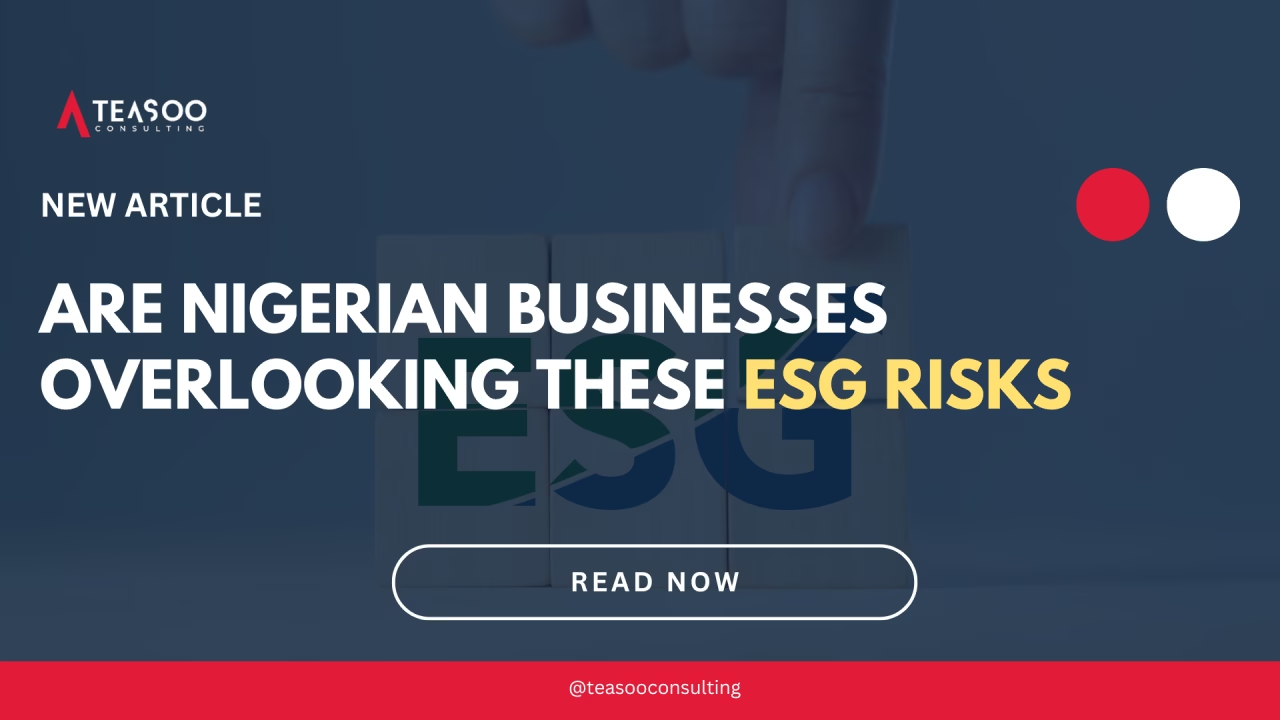#15 Are Nigerian Businesses Overlooking These ESG Risks?

- Only 34% of Nigeria’s top 100 companies see climate change as a business risk.
- Just 22% acknowledge biodiversity loss as a risk, despite its growing impact on global operations.
- 45% acknowledge social risks, and 41% acknowledge governance risks, meaning that less than half even consider social and governance risks as potential threats to their bottom line.
- Less than 25% have their ESG disclosures independently verified, heightening the risk of greenwashing.
These figures highlight a significant blind spot in ESG risk management, reflecting how far behind we are in recognizing how ESG issues directly affect business performance and investor confidence, especially as global investor scrutiny and local regulations intensify.
The Key ESG Risks Nigerian Businesses Commonly Overlook
1. Environmental Blind Spots
- Biodiversity Loss: This is not just a global conversation; it is a direct risk to local businesses. Yet, only 22% of companies are factoring it into their operations. When ecosystems collapse, access to land and raw materials becomes harder, driving up operational costs and threatening long-term viability.
- Carbon Emissions and Climate Adaptation: Compared to countries like the UK with 94% and South Africa with 67%, only one-third of Nigerian businesses recognise climate change as a financial risk. This under-prioritisation leaves Nigerian firms exposed to physical climate impacts, regulatory penalties, and stranded assets
- Pollution and Waste Management: Many sectors underplay the long-term costs and regulatory consequences of poor waste management, toxic emissions, and latent liabilities that could potentially trigger legal and reputational fallout.
2. Social Oversights
- Workforce Well-being and Social Unrest: Labour disruptions, regional tensions, security concerns, economic discontent, and unemployment are already part of our daily headlines. The Nigerian Economic Summit Group flagged these risks in 2025, but how many companies are actively building resilience into their operations?
- Community Impact: Especially in the oil and gas sector, disregard for local livelihoods, poor stakeholder engagement, and inadequate compensation fuel longstanding regional tensions and legal disputes, directly affecting business continuity and operations.
3. Governance Gaps
- Board-Level ESG Ownership: Only 20% of Nigeria’s top 100 companies have a board member dedicated to ESG. If sustainability isn’t tied to KPIs, compensation, and decision-making, how are we holding leadership accountable?
- ESG Reporting and Greenwashing: Fewer than 25% of companies seek third-party assurance, risking inflated claims and regulatory scrutiny. Without third-party validations, companies stand the risk of not only regulatory fines but also reputational damage and stakeholder trust.
Risks Amplified by the Evolving Nigerian Regulatory Landscape
2028: Mandatory Sustainability Reporting for Public Interest Entities: Nigeria’s Finance Reporting Council (FRC) has mandated the adoption of International Financial Reporting Standards (IFRS) S1 (sustainability-related financial disclosures) and S2 (climate-specific disclosures), effective January 1, 2028, for public interest entities and January 1, 2030, for SMEs. Early voluntary adoption between 2024 and 2027 offers a strategic window for organisations to build internal capacity and strengthen ESG reporting systems. Delayed implementation increases exposure to regulatory penalties, erodes investor confidence, and may result in missed opportunities for ESG-aligned contracts and partnerships.
Why Overlooked ESG Risks Threaten Long-Term Sustainability
ESG Risk and Potential Business Impacts
- Climate Change & Carbon: Supply disruptions, regulatory fines, and stranded assets
- Biodiversity Loss: Reduced access to raw materials, reputational damage, and land disputes
- Social Unrest: Operational shutdowns, community litigation, loss of social license
- Insufficient Governance: Shareholder action, falling investor confidence, and legal penalties
How to Address Overlooked ESG Risks
- Start ESG Integration Now: Run voluntary reporting cycles, even before mandatory deadlines, to identify data gaps and establish a robust ESG culture.
- Cross-Departmental ESG Task Force: Form teams across HR, supply chain, finance, operations, and compliance for a truly embedded ESG approach.
- Board Accountability: Appoint ESG-responsible directors; tie executive compensation to sustainability targets.
- Third-Party Assurance: Pursue independent audits of ESG disclosures to elevate trust and avoid greenwashing accusations.
- Engage Stakeholders: Regularly consult employees, communities, and supply partners to stay ahead of social and environmental risks.
Conclusion
Nigerian businesses face a new era where ESG risks will increasingly dictate access to finance, customer loyalty, regulatory approval, and market relevance. The data shows clear blind spots, particularly in biodiversity, climate change, and governance. The next few years will separate proactive companies that prepare for these challenges from those who find themselves unprepared. It’s time to act, before overlooked ESG risks become existential threats to your business.






